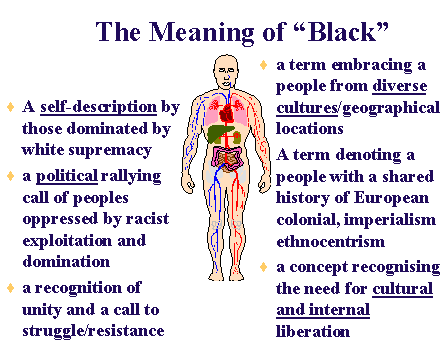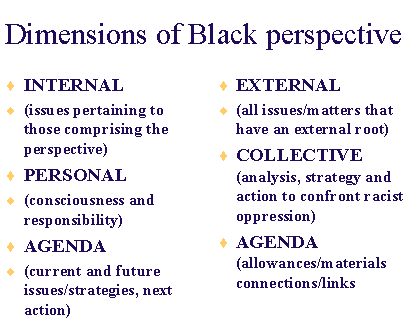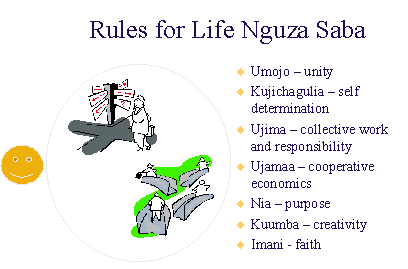The Need for a Black Perspective
From
a plenary by Carlton Howson at "Making a Difference" March 2001.
|
It
is customary that I should first ask permission from an elder amongst us, before
I speak to you today. For this purpose, I request permission from Theresa. This
talk, and indeed the whole day, has an aim of making a contribution to the
ongoing struggle, and it will be located within the context of that struggle. It
is located within the context of a Runnymede Trust report that questions notions
of Britishness. This report tried to ascertain what the situation is like across
the board for Black people in Britain, and as a result – we need to begin to
ask some questions. If
the world came to an end tomorrow, and you were asked to account for all the
things you have done, the differences you have made, how would you answer? What
difference have you made to the lives of those who suffer? We spend so much time
in reflection – if only I had done this, etc. The initiative here today is to
make steps towards making a difference. When
we see our brothers and sisters in struggle, we are able to lend assistance to
them. Have a look at the Social Exclusion Unit’s report findings. Black people continue to occupy the worst kind of situations in life. They receive the worst housing; they are educated to a lesser standard. If we look at healthcare, and begin to look at the levels and statistics in diet, mental health, sexual health; members of our community are disproportionately in mad houses. African Caribbean men are locked away. Looking
now at education. Black children are excluded from schools, and when we begin to
ask questions, what we discover is that some of our most brightest children are
being excluded. Sure, its easy to have the notion that the disruptive ones are
put outside. What some of these people are doing is actually challenging the
system to deliver. In
crime, far more black people are in prison systems. Judging on the amount of
people in these prisons, you would think that the whole of the black community
are in there. This serves in our appreciation of the situation we have today. We
all carry baggage, not all experience society in the same way. Some of us are
tempted to say, its all fair, its all equal. Others say that there are problems,
and when they react to them, they become ‘disaffected’. We
continue to see the same patterns of inequality; some of us continue to be
reproduced as the weakest link. We ask questions about perspective. A definition of perspective could be the particular view or way of understanding the world. Perspectives are based on experience; you have a notion of how society is. That view comes into conflict from time to time. We hear about dominant views, “it is just so”, “this is the way it is”. We know of the white perspective around us, for it is the norm. When
black people are outside of the norm, we have to look again and we have to say,
how can we develop a way of seeing the world from a black perspective?
Through the work of ancestors, we can begin to learn and discover ways of
dealing with our difficulties. We can begin to move forward. A Black perspective embraces political and historical consequences:
These
views can be either positive or negative. For example, a host population that
sees immigration as largely anti-British can regard some people who see
themselves as ‘immigrants’, as negative. Yet, the vast majority of Black
people are British. How, then, does it feel to be described in such a negative
fashion. Of late, we have seen a massive backlash against refugees.
Circumstances have led them to seek asylum, but they find themselves with a new
racism. The images of boats and banners, of Britain as a ‘soft-touch’ leads
us to ask a few questions. What does this do for foreigners? What impact does
this have on those who are already settled? This kind of racism still takes place, sanctioned by the government, with legislation compounding ‘second class citizens’.
When we come to develop our identity, we consider both the internal and external interplay. Neither is far apart and all issues have an external route. It could be based on how others react to you and how you interact in the world around you. From this identity form the external and internal dimensions of a Black perspective: If
we have spoken about Black, what then does that mean for white? There is
recognition that some people are routinely positioned at poles in society, when
they have centred themselves. How do they find a new central place? We begin, of
course, with conflict – not going with the flow. We know about the development
of antiracist conflict perspectives aimed at challenge, those have been
necessary in order to awaken people. We should not see these things as divisive.
It is using a situation to analyse discrimination, in pursuit of something more
holistic. Antiracist
is not about cultural awareness, or ‘ethnicity’. It is not seeking to
replace one oppression with another. It challenges
the system, instead of accommodating it, like the ‘multicultural’ models
do. It is a community approach, one that seeks to unite and serves as an
analytical tool which can help us to understand ‘us’ in relation to the
wider scheme of things. We can begin to understand how white society is, whether
we need to engage in a critique of something and we have another way of
exploring our experiences. We
operate within a functionalist society – where you are, is where you deserve
to be. Even when black people gain higher qualifications, this is not
represented in the work force. This is an example of thinking that begins right
from childhood – the racism that is part of wider values implicit in the
structures of society. Therefore, it can be implied that black people are the
cause of social ills. The ideas of who has contributed to civilisation can be
used as a justification for control. This kind of mental bondage is continually
with us. Despite
it all, we continue to thrive and we continue to survive what is done to us.
Instead of operating and accepting fringe or underclass, we must locate
ourselves within the centre. Powerful people will not help; powerful people
never have to prove anything. By extension, they never apologise. We need to
take a giant step forward. After all, if you have the power, the objective is to
hold on to it. You have to find the means and ways to make changes. Identify yourself with your history, colour, culture and this is the first step towards a consciousness. Form the principles you feel are important and those by which you want to live by:
Develop
your principles and develop your identity. Remember the ‘five C’s’ of
identity – who are you in terms of colour,
character, class, context and culture.
|
Carlton Howson is a Senior Lecturer in the Division of Youth and Community Work, De Montfort University, Leicester.
Please
always reference the author of this page. How
to reference us.
Copyright © 1999-2002 Student Youth Work Online. All rights reserved.
Revised: February 14, 2002
.
![]() Contact the author
for further discussion about this paper
Contact the author
for further discussion about this paper


